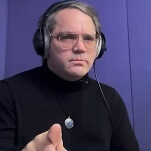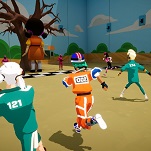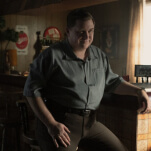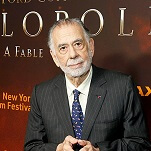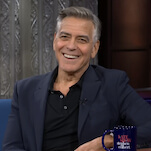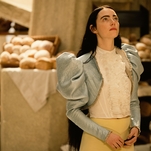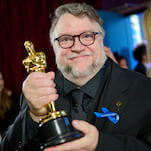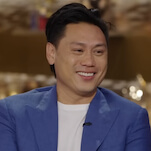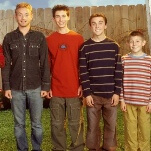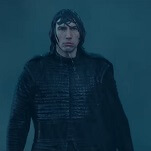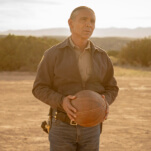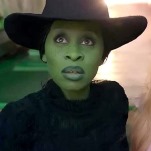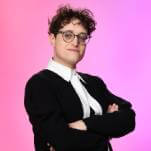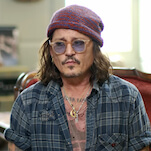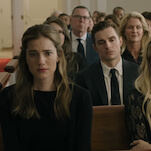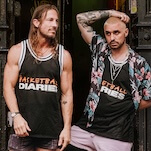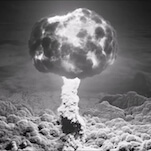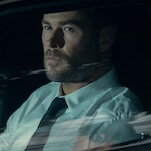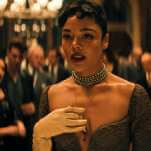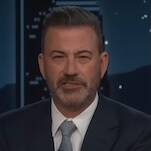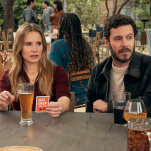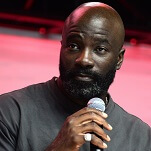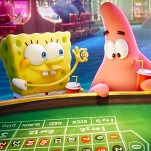After falling out with producer Rick Rubin and Def Jam, the label Rubin co-owned with Russell Simmons, the Beastie Boys redefined themselves on 1989's Paul's Boutique. The densely layered, sample-heavy album was an artistic triumph, though its departure from Licensed To Ill's style led to low sales. In time, Paul's Boutique became a cult hit and earned the Beastie Boys artistic credibility, which grew when they used live instruments on 1992's Check Your Head. The album became a hit, and so did its 1994 successor, Ill Communication. On subsequent albums—1998's Hello Nasty and 2004's To The 5 Boroughs—Beastie Boys expanded further and got back to basics, respectively, while always maintaining its sonic fearlessness.
AY: There were four different trips to the bathroom, so there were a bunch of pee-pee shots.
AVC: And one made it in.
AY: One made it into the film, yeah.
MD: None too graphic, I might add. I would have preferred a little more graphic—that's me.
AY: Adam wanted to see less information, not more.
Adam Horovitz: Me, personally, I didn't need to see the pee, you know what I mean? For me, just the sound was enough—you get the idea.
AY: He's a team player, though. I said, "The pee is really important to me." Adam said, "Well, if it's that important to you, you're a fucking golden-shower weirdo."
AH: Which is documented and is true—he is a golden-shower weirdo, unfortunately.
AVC: Musically, you've explored a lot of different styles on your albums. When you go back into the studio, how do you avoid feeling like you've done it already?
AY: I don't really look at it like there's anything… like if we do some shit that's completely new, that's cool. If we do some shit that's similar to stuff we did before, that's okay, too. Usually we just mess around and see what sounds good.
MD: But we will sit down and play each other stuff we've been listening to and get inspired as to what we like, just kind of talk about ideas: "Okay, what could we do that'd be a little bit different than this?" or "Where could we take this?"
AH: And we check demographics against sales charts for what's hot now.
MD: Of course, I bring my young writing team in to sort of bounce, to "collabo" as I like to call it, on ideas.
AY: Yeah, you gotta let people see you're on the street.
AVC: So maybe some reggaeton on the new one?
AH: A lot of reggaeton. Grunge is back, so we're doing the new grunge-reggaeton.
MD: Grunge-reggaeton hybrid, because we figured that will really cross over.
[pagebreak]
AVC: There have been increasingly longer breaks between records. It was six years between Hello Nasty and To The 5 Boroughs. It's only been two since 5 Boroughs, so is it going to be a while before you release another one?
AH: Oh, it's going to be a while. I'm not gonna lie to you. I think we'll hit around average, probably, our newer average.
AVC: Newer average?
AH: Yeah, before the average was a couple years, maybe two, three.
AY: It was three—three years.
AH: Now the sort of average we're leaning toward is like a five- or six-year period.
AY: The average has gone up.
AH: We'll be right around the new average.
AY: It's a mean average.
AH: "Mean average," you said?
AY: It's just some kind of math term I wanted to use. I don't really know what it means.
AVC: Do you think it will have a singular hip-hop sound like To The 5 Boroughs, or be more expansive, like Check Your Head or Ill Communication?
AY: Probably change it up, but I don't want to reveal any secrets that we don't have yet.
MD: I think it's time for the band to go dark.
AVC: Like goth?
AY: I was more in like a CIA sense: "We're going dark!" [Laughs.]
MD: That too. I was thinking goth, like eyeliner.
AVC: Are you working with a producer, or doing it yourselves again?
AH: See, with a producer, you have to give extra money to that person, you know what I mean? They're throwing their opinions in.
MD: I think Burt Bacharach—the man's clearly a well-established songwriter behind a lot of incredible songs and productions.
AY: Did he work with Dolly Partner [sic]?
AH: At some point.
MD: I can't imagine he has not worked with Dolly Partner.
AVC: He's not too young, though, and you mentioned your young writing team. Obviously, it's a youth-oriented market…
MD: Yeah, I've got one of the best names—I can't say her name, but she's from the show Family Man. She's on my writing staff. [Laughs.]
AVC: You come from a punk background, and punk and hip-hop are relatively new genres. There aren't really a lot of "founding fathers" who have hit advanced age…
AY: Why you gotta say it like that?
[pagebreak]
AVC: Not you specifically, but you don't necessarily have people who have gone through this before to look to as an example.
AH: There's a weird thing in rap that there isn't in any other music, especially rock or punk. Unfortunately, Joe Strummer's not around, but we had, like, in punk, those first-generation punks that are around and everybody looks up to, and still try to play like those bands. Nobody's trying to sound like Run DMC or Furious Five. No one's looking to be Chuck D. That's just how it is.
AVC: Why do you think that is?
AH: The fucking kids.
AY: Though the beats do get recycled by new people with the old beats, but there's not that kind of love of the old stuff.
AVC: Can you guys see yourselves writing and performing as the Beastie Boys for another 10, 20 years?
MD: Well, if I have a crack young team…
AY: …another 75 years.
AVC: Do you see yourselves maybe as moving into a studio focus down the line?
AH: Now we know that's not going to happen.
AVC: As opposed to going on big tours and stuff.
AY: Like a Vegas thing?
MD: I see it more as a regional theater thing, like set up a residency, say, in Missoula, Montana—really just set down our roots in a theater for a while.
AY: Rather than going on tour to people, people'd have to come see us. Like what David Bowie did. David Bowie booked a year at some club in New York.
AVC: That's what Celine Dion did in Vegas.
AH: She's crazy for doing that kind of shit.
AY: Actually I don't know. I think it's a year.
MD: I called her up, I was like, "Yo, Celine, you crazy for that one!"
AY: No, because David doesn't like to fly.
AH: It was like he set up and played like every few days for a month or so.
AVC: You three interviewed Russell Simmons a while back. Have you made peace with your past, with him and Rick Rubin? Has enough time passed?
AH: Enough time has passed. That was a different lifetime. You just take the good things with the bad.
MD: That being said, we all hold on to deep-seated hatred and anger toward both of them.
AH: I am slightly a grudge-oriented person—I'm not going to lie.
MD: We have a lot of animosity. It's a very beautiful kind of animosity; it's very spiritual.
AVC: Has your perspective on your albums changed over the years? People seem to think you were down on Licensed To Ill for a while.
MD: I don't know, lately, people will try to make up a lot about, I guess, when we were on tour and maybe doing Check Your Head or something, we played only a couple Licensed To Ill cuts, and maybe now in our live shows we play a few more. But I don't know there was a conscious decision on our part.
AH: Well, I mean, there's some dumb shit [on Licensed To Ill].
MD: Yeah, there's dumb shit. We're not going to change the lyrics around, you know what I mean? But it wasn't like "Okay, well, we're going to put in two songs for this tour, and in another 10 years, we're going to work up to five." Although some of my crack writing team were advising certain things. They were whispering in my ear.
AVC: In Alan Light's The Skills To Pay The Bills, there's some mention of the "Elvis factor"—at the beginning, people worried that the Beastie Boys were just another white group co-opting black music. How did you handle that?
AH: It didn't really ever touch us that much.
AY: If there was that, it was pretty short-lived—like I think there was a moment when Licensed To Ill exploded, then I think it kind of crashed.
MD: Yeah, I think they could see at that moment that Licensed To Ill had been huge and was such a fast-selling record that it was like, "Whoa, wait a second. What happened to rap music as we knew it?" But I think it was so quickly, in a way, eclipsed artistically and commercially by other hip-hop albums.
AY: Public Enemy really took the spotlight, which is a good thing. It sort of brought it back in the right direction.
AH: And I do think our thing was kind of weird enough that it wasn't like we were trying to do this thing… I don't know. It just seemed like our thing was weird. People were mad at it, but not for that reason, I don't think. I'm sure some were, understandably.
